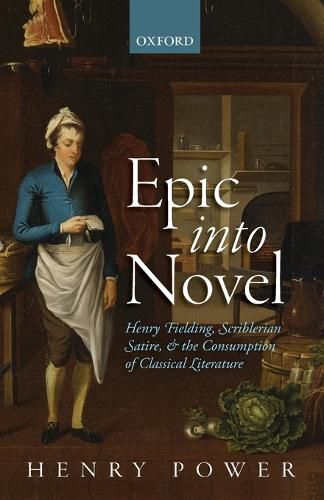Readings Newsletter
Become a Readings Member to make your shopping experience even easier.
Sign in or sign up for free!
You’re not far away from qualifying for FREE standard shipping within Australia
You’ve qualified for FREE standard shipping within Australia
The cart is loading…






Epic into Novel examines an unexplored tension in Fielding’s work: the tension between his commitment to the classical tradition and his immersion in a print culture in which books were regarded as consumable commodities. It gives a fresh account of Fielding’s engagement with classical literature, showing how he fashioned his novels out of ancient epic. It also shows how Fielding drew on the language of cookery and consumption in order to characterize his relationship with the market. This interest in the place of the ancients in a world of consumerism was inherited from the previous generation of satirists. The ‘Scriblerians’–among them Jonathan Swift, John Gay, and Alexander Pope–repeatedly suggest in their work that classical values are at odds with modern tastes and appetites. Fielding, who had idolized these writers as a young man, developed many of their satiric routines in his own writing. But Fielding broke from Swift, Gay, and Pope in creating a version of epic designed to appeal to modern consumers. Henry Power draws on a range of sources–including eighteenth-century cookery books as well as works of classical literature–to offer fresh readings of works by Swift, Gay, and Pope, and of Fielding’s major novels. Epic into Novel explores Fielding’s engagement with various Scriblerian themes, primarily the consumption of literature, but also the professionalization of scholarship, and the status of the author. It shows ultimately that Fielding broke with the Scriblerians in acknowledging and celebrating the influence of the marketplace on his work.
$9.00 standard shipping within Australia
FREE standard shipping within Australia for orders over $100.00
Express & International shipping calculated at checkout
Epic into Novel examines an unexplored tension in Fielding’s work: the tension between his commitment to the classical tradition and his immersion in a print culture in which books were regarded as consumable commodities. It gives a fresh account of Fielding’s engagement with classical literature, showing how he fashioned his novels out of ancient epic. It also shows how Fielding drew on the language of cookery and consumption in order to characterize his relationship with the market. This interest in the place of the ancients in a world of consumerism was inherited from the previous generation of satirists. The ‘Scriblerians’–among them Jonathan Swift, John Gay, and Alexander Pope–repeatedly suggest in their work that classical values are at odds with modern tastes and appetites. Fielding, who had idolized these writers as a young man, developed many of their satiric routines in his own writing. But Fielding broke from Swift, Gay, and Pope in creating a version of epic designed to appeal to modern consumers. Henry Power draws on a range of sources–including eighteenth-century cookery books as well as works of classical literature–to offer fresh readings of works by Swift, Gay, and Pope, and of Fielding’s major novels. Epic into Novel explores Fielding’s engagement with various Scriblerian themes, primarily the consumption of literature, but also the professionalization of scholarship, and the status of the author. It shows ultimately that Fielding broke with the Scriblerians in acknowledging and celebrating the influence of the marketplace on his work.